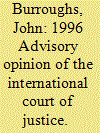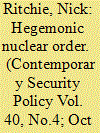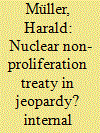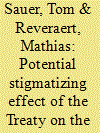| Srl | Item |
| 1 |
ID:
146754


|
|
|
|
|
| Contents |
The 1996 advisory opinion of the International Court of Justice (ICJ) was the culmination of a decades-long debate on the legality of nuclear weapons. In recent years, it has shaped how international law is invoked by the initiative focused on the humanitarian impacts of nuclear weapons use and served as a foundation for the nuclear disarmament cases brought by the Marshall Islands in the court.
|
|
|
|
|
|
|
|
|
|
|
|
|
|
|
|
| 2 |
ID:
168437


|
|
|
|
|
| Summary/Abstract |
The notion of a “global nuclear order” has entered the lexicon of nuclear politics. The 2017 Treaty on the Prohibition of Nuclear Weapons has prompted further questions about how we understand it. Yet missing from analysis of nuclear order and the “Ban Treaty” is a critical analysis of the power relations that constitute that order. This article develops a critical account of global nuclear order by applying Robert Cox's concept of hegemony and power to the global politics of nuclear weapons, drawing on the politics of the Ban Treaty. It theorizes a “nuclear control order” as a hegemonic structure of power, one that has been made much more explicit through the negotiation of the Ban Treaty. This fills a void by taking hegemony and power seriously in theorizing nuclear order, as well as explaining both the meaning of the Ban Treaty and its limits.
|
|
|
|
|
|
|
|
|
|
|
|
|
|
|
|
| 3 |
ID:
158681


|
|
|
|
|
| Summary/Abstract |
The nuclear age has come to be seen as “normal,” marked by a process of “nuclearism” whereby nuclear weapons and deterrence are seen as inevitable and acceptable elements of international security. Factors which have allowed this to flourish include the relative absence of humanitarian considerations, nuclear decision-making by a select few, and the unequal nature of the Non-Proliferation Treaty (NPT), where the P5 states have shaped the nuclear order on their own terms. The “humanitarian initiative” and Treaty on the Prohibition of Nuclear Weapons challenge this “normal” nature of nuclear weapons, re-casting them as incompatible with humanitarian law, and delegitimizing them for all states. This shift away from the structural constraints of the NPT allows non-nuclear states a degree of agency they did not previously possess. Nonetheless, the Treaty faces difficulty in dislodging the practices of the nuclear-weapon states, suggesting that its value lies in its long-term normative influence.
|
|
|
|
|
|
|
|
|
|
|
|
|
|
|
|
| 4 |
ID:
152540


|
|
|
|
|
| Summary/Abstract |
The frustration of non-nuclear weapon states about the lack of progress in nuclear disarmament has reached boiling point: a vast majority of them have supported a resolution in the UN General Assembly that establishes a negotiation forum for concluding a prohibition of nuclear weapons in 2017. Rising tension among the nuclear powers and populist movements feeding nationalist emotions make it unlikely that the situation will change for the better in the near future. It is thus possible that the NPT might be eroded or, in the worst case scenario, simply collapse because of diminishing support.
|
|
|
|
|
|
|
|
|
|
|
|
|
|
|
|
| 5 |
ID:
167794


|
|
|
|
|
| Summary/Abstract |
On July 7, 2017, seventy-two years after the start of the nuclear era, 122 states concluded the Treaty on the Prohibition of Nuclear Weapons (TPNW, or “ban treaty”). The treaty forbids the development, production, acquisition, possession, transfer, testing, use, and threat of use of nuclear weapons. Advocates of the TPNW understand that it will not automatically lead to a world without nuclear weapons. The treaty’s main goal is to stimulate a societal and political debate inside the nuclear-armed states and their allies by strengthening the antinuclear norm and by stigmatizing nuclear weapons and their possessors. This article assesses to what extent this process of stigmatization might take place. It starts by elaborating on the concepts of stigma and stigmatization. It then matches the concept of stigma with nuclear weapons, and with the humanitarian initiative behind the momentum that led to the TPNW. The article concludes by looking to different stigma-management approaches that can be used by the nuclear-armed states and their allies.
|
|
|
|
|
|
|
|
|
|
|
|
|
|
|
|